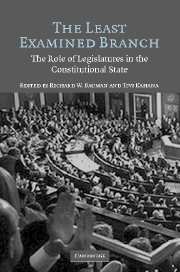Book contents
- Frontmatter
- Contents
- Foreword: Legislatures in the Constitutional State by Amy Gutmann
- Contributors
- New Ways of Looking at Old Institutions
- PART ONE LEGISLATURES AND DEMOCRATIC THEORY
- PART TWO LEGISLATING AND DELIBERATING IN THE DEMOCRATIC LEGISLATURE
- PART THREE CONSTITUTION MAKING BY LEGISLATURES: THE EXPLICIT VERSION
- PART FOUR CONSTITUTION MAKING BY LEGISLATURES: THE IMPLICIT VERSION
- PART FIVE CONSTITUTIONAL INTERPRETATION AND APPLICATION BY THE LEGISLATURE
- PART SIX IS LEGISLATIVE CONSTITUTIONALISM POSSIBLE?
- 20 Democratic Decision Making as the First Principle of Contemporary Constitutionalism
- 21 Legislative Constitutionalism in a System of Judicial Supremacy
- 22 Between Supremacy and Exclusivity
- 23 Legislatures as Rule-Followers
- 24 Popular Revolution or Popular Constitutionalism? Reflections on the Constitutional Politics of Quebec Secession
- PART SEVEN THE LEGISLATURE IN DIALOGUE: DOMESTIC AND INTERNATIONAL CONTEXTS
- Index
21 - Legislative Constitutionalism in a System of Judicial Supremacy
Published online by Cambridge University Press: 06 August 2009
- Frontmatter
- Contents
- Foreword: Legislatures in the Constitutional State by Amy Gutmann
- Contributors
- New Ways of Looking at Old Institutions
- PART ONE LEGISLATURES AND DEMOCRATIC THEORY
- PART TWO LEGISLATING AND DELIBERATING IN THE DEMOCRATIC LEGISLATURE
- PART THREE CONSTITUTION MAKING BY LEGISLATURES: THE EXPLICIT VERSION
- PART FOUR CONSTITUTION MAKING BY LEGISLATURES: THE IMPLICIT VERSION
- PART FIVE CONSTITUTIONAL INTERPRETATION AND APPLICATION BY THE LEGISLATURE
- PART SIX IS LEGISLATIVE CONSTITUTIONALISM POSSIBLE?
- 20 Democratic Decision Making as the First Principle of Contemporary Constitutionalism
- 21 Legislative Constitutionalism in a System of Judicial Supremacy
- 22 Between Supremacy and Exclusivity
- 23 Legislatures as Rule-Followers
- 24 Popular Revolution or Popular Constitutionalism? Reflections on the Constitutional Politics of Quebec Secession
- PART SEVEN THE LEGISLATURE IN DIALOGUE: DOMESTIC AND INTERNATIONAL CONTEXTS
- Index
Summary
To speak of legislative constitutionalism in the American context may seem paradoxical. After all, America famously provides the model of judicial supremacy. Certainly, compared with the Westminster model in which the legislature has unlimited sovereignty, legislative constitutionalism seems far removed from the American scheme. Yet, a little reflection reveals that the American system actually contains important fragments of legislative constitutionalism. That is, Congress has a number of means for shaping, massaging, and sometimes even supplanting judicial doctrine, putting an important gloss on judicial supremacy.
Equally importantly, major parts of the fundamental structure of government are due to congressional action rather than constitutional text or judicial interpretation. Such legislation provides parts of the basic frame of government, and gain their stability (as in Westminster constitutionalism) from custom rather than judicial enforcement. In English usage, these structural rules would undoubtedly be called “constitutional.” If these rules are not part of what Americans call constitutional law, they at least deserve to be called quasi-constitutional.
Paradoxically, judicial supremacy itself could be considered a matter of quasi-constitutional law, due in no small part to Congress's long-standing stance toward the federal courts. Congress created the lower federal courts, without which the Supreme Court would lack reliable enforcers of its decrees. In the first Judiciary Act, Congress authorized judicial review before John Marshall was even appointed to the Supreme Court.
- Type
- Chapter
- Information
- The Least Examined BranchThe Role of Legislatures in the Constitutional State, pp. 431 - 451Publisher: Cambridge University PressPrint publication year: 2006

